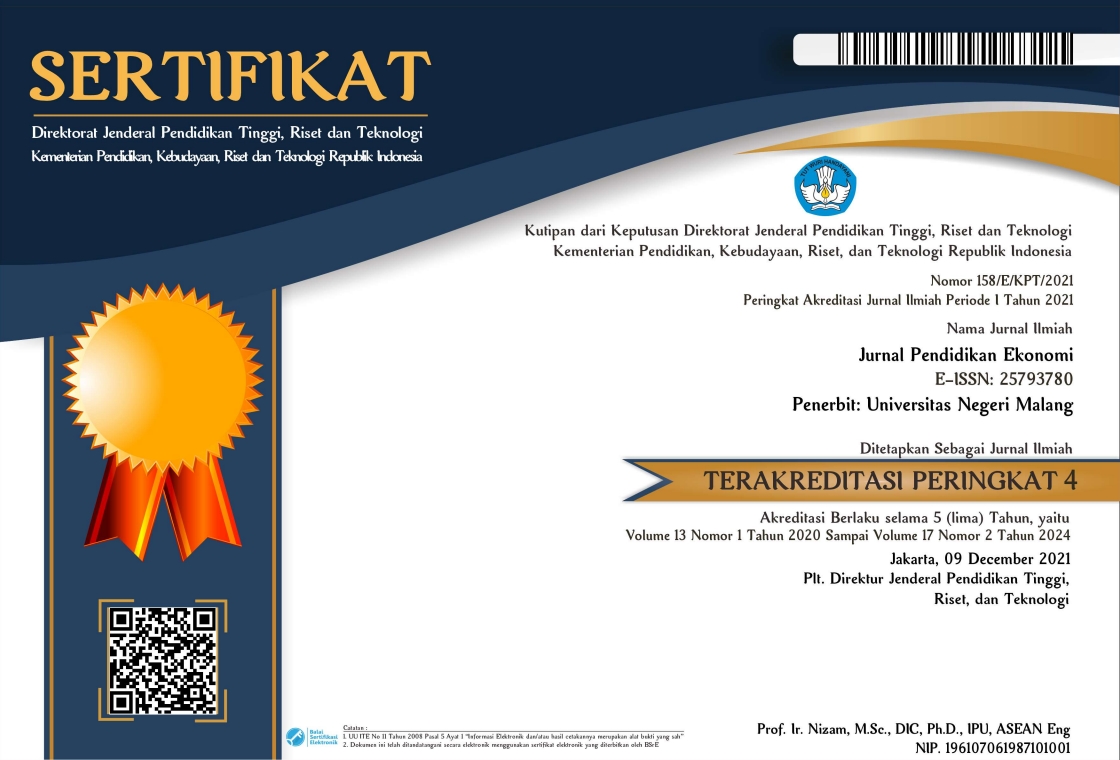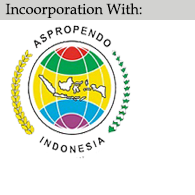Transforming into A Digitally Prepared Academic Community: The Perfect Mediating Role of Perceived Usefulness
Abstract
Keywords
Full Text:
PDFReferences
Ahmed, F., Qin, Y., & Aduamoah, M. (2018). Employee readiness for acceptance of decision support systems as a new technology in E-business environments; A proposed research agenda. 2018 7th International Conference on Industrial Technology and Management, ICITM 2018, 2018-Janua, 209–212. https://doi.org/10.1109/ICITM.2018.8333948
Alenezi, M. (2023). Digital Learning and Digital Institution in Higher Education. Education Sciences, 13(1), 1–18. https://doi.org/10.3390/educsci13010088
Alqam, H., Razzak, M., Al-busaidi, A., & Al-riyami, S. (2024). Conceptualizing Digital Readiness, Strategic Foresight , and Strategic Flexibility as Drivers of Digitalization and Performance of Small and Medium Enterprises. International Journal on Informatics Visualization, 8(May), 938–947.
Alwi, M. (2022). Kepemimpinan Transformasional: Meningkatkan Daya Saing Perguruan Tinggi di Era Industri 4.0. JUPENJI : Jurnal Pendidikan Jompa Indonesia, 1(2), 87–97. https://doi.org/10.55784/jupenji.vol1.iss2.227
Azanza, G., Korres, O., Paños-Castro, J., & Petchamé, J. (2024). Empowering University Lecturers in the Digital Age: Exploring the Factors Influencing the Use of Digital Technologies in Higher Education. Education Sciences, 14(7), 1–12. https://doi.org/10.3390/educsci14070728
bin Abdahir, M. R., bin Wan Hussin, W. S., & Rasiah, R. (2021). New Business Venture into Private Higher Education in Malaysia through Dynamic Capabilities. Asian Journal of University Education, 17(4), 117–131. https://doi.org/10.24191/ajue.v17i4.16191
Dang, T. D., Phan, T. T., Vu, T. N. Q., La, T. D., & Pham, V. K. (2024). Digital competence of lecturers and its impact on student learning value in higher education. Heliyon, 10(17), e37318. https://doi.org/10.1016/j.heliyon.2024.e37318
Desaili, D., Anjaningrum, W. D., & Viloria, V. A. (2023). Big Five Personality Traits and Employee Performance: Evidence from Mediation and Moderation Analysis. Jurnal Pendidikan Bisnis Dan Manajemen, 9(3), 275–293. Retrieved from http://dx.doi.org/10.17977/um003v9i32023p274
Doğanülkü, H. A., & Korkmaz, O. (2023). The role of proactive personality and general self ‑ efficacy in proactive career behavior : a mediation model. International Journal for Educational and Vocational Guidance, (0123456789), 1–25. https://doi.org/10.1007/s10775-023-09597-9
Fahmi, T. A., Tjakraatmadja, J. H., & Ginting, H. (2023). An Empirical Study of Emerging Digital Culture and Digital Attitudes in an Established Company. Journal of Industrial Engineering and Management, 16(2), 342–362. https://doi.org/10.3926/jiem.5976
Gao, P., & Gao, Y. (2024). How Does Digital Leadership Foster Employee Innovative Behavior: A Cognitive–Affective Processing System Perspective. Behavioral Sciences, 14(5), 1–29. https://doi.org/10.3390/bs14050362
Gestiardi, Sarwanto, Chumdari, & Maryani. (2021). Using an Technology Readiness Model to Understand Perceived Usefulness of Learning in the Covid-19 Era. International Journal of Elementary Education, 5(4), 631–638. https://doi.org/https://doi.org/10.23887/ijee.v5i4.39188
Hair, J. F., Hult, G. T. M., Ringle, C. M., & Sarstedt, M. (2017). A Primer on Partial Least Squares Structural Equation Modeling (PLS-SEM). Thousand Oaks. In Sage (Second Edi). Washington DC, USA.
Halim, N. H. A., Azlan, M. A. M., Adzhar, M. N. A. N., & Hussein, N. (2023). Accelerating Digital Talent Readiness in Malaysian Banking Sector: A Study on Technology Adoption Through the Intention to Use Customer-Focused Digital Solutions. AT-TAWASSUTH: Jurnal Ekonomi Islam, VIII(I), 1–19.
Hamid, R. A. (2022). The Role of Employees ’ Technology Readiness , Job Meaningfulness and Proactive Personality in Adaptive Performance. Sustainability, 14(15696), 1–16. https://doi.org/https://doi.org/10.3390/su142315696
Hidayat, S., Febrianto, Z., Eliyana, A., Purwohedi, U., Anggraini, R. D., Emur, A. P., & Zahar, M. (2023). Proactive personality and organizational support in television industry: Their roles in creativity. PLoS ONE, 18(1 January), 1–23. https://doi.org/10.1371/journal.pone.0280003
Höyng, M., & Lau, A. (2023). Being ready for digital transformation: How to enhance employees’ intentional digital readiness. Computers in Human Behavior Reports, 11(June), 1–11. https://doi.org/10.1016/j.chbr.2023.100314
Hu, Y., Pan, Y., Yu, M., & Chen, P. (2024). Navigating Digital Transformation and Knowledge Structures : Insights for Small and Medium ‑ Sized Enterprises. In Journal of the Knowledge Economy. https://doi.org/10.1007/s13132-024-01754-x
Huang, R. T., Tang, T. W., Lee, Y. P., & Yang, F. Y. (2017). Does proactive personality matter in mobile learning? Australasian Journal of Educational Technology, 33(2), 86–96. https://doi.org/10.14742/ajet.2896
Javaid, M., Haleem, A., Singh, R. P., & Sinha, A. K. (2024). Digital economy to improve the culture of industry 4.0: A study on features, implementation and challenges. Green Technologies and Sustainability, 2(2), 100083. https://doi.org/10.1016/j.grets.2024.100083
John, Z., Belmonte, A., Tri, Y., Madel, M., Cahigas, L., Nadlifatin, R., … Gumasing, J. (2024). Acta Psychologica Factors influencing the intention to use e -wallet among generation Z and millennials in the Philippines : An extended technology acceptance model ( TAM ) approach. Acta Psychologica, 250(October), 104526. https://doi.org/https://doi.org/10.1016/j.actpsy.2024.104526
Jones, M. D., Hutcheson, S., & Camba, J. D. (2021). Past, present, and future barriers to digital transformation in manufacturing: A review. Journal of Manufacturing Systems, 60(March), 936–948. https://doi.org/10.1016/j.jmsy.2021.03.006
Klein, S. P., Spieth, P., & Söllner, M. (2024). Employee acceptance of digital transformation strategies : A paradox perspective. Journal of Product Innovation Management, 41, 999–1021. https://doi.org/10.1111/jpim.12722
Liu, Q., & Tong, Y. (2022). Employee Growth Mindset and Innovative Behavior : The Roles of Employee Strengths Use and Strengths-Based Leadership. Frontiers in Psychology, 13(June), 1–12. https://doi.org/10.3389/fpsyg.2022.814154
Masalee, N., Ariratana, W., & Sirisooksilp, S. (2021). Developing Factors and Indicators of Growth Mindset for School Administrators in Thailand. International Educational Research, 4(1), 61–70. https://doi.org/10.30560/ier.v4n1p61
Nurwahdania, Pardiman, & Mullaningtyas, R. (2022). Preferensi Mahasiswa dalam Memilih Perguruan Tinggi Swasta di Kota Malang. E-Jurnal Riset Manajemen, 11(11), 113–120. Retrieved from https://jim.unisma.ac.id/index.php/jrm/article/view/18164
Ostmeier, E., & Strobel, M. (2022). Building skills in the context of digital transformation: How industry digital maturity drives proactive skill development. Journal of Business Research, 139(October 2021), 718–730. https://doi.org/10.1016/j.jbusres.2021.09.020
Perwitasari, A. W. (2022). The Effect of Perceived Usefulness and Perceived Easiness towards Behavioral Intention to Use Fintech by Indonesian MSMEs. The Winners, 23(1), 1–9. https://doi.org/10.21512/tw.v23i1.7078
Pingali, S. R., Singha, S., Arunachalam, S., & Pedada, K. (2023). Digital readiness of small and medium enterprises in emerging markets : The construct , propositions , measurement , and implications. Journal of Business Research, 164(August 2022), 113973. https://doi.org/10.1016/j.jbusres.2023.113973
Pyo, D., Kwak, K., & Kim, Y. (2024). The mediating effect of growth mindset in the relationship between adolescents’ optimism and grit. Current Psychology, 43(21), 19153–19161. https://doi.org/10.1007/s12144-024-05656-8
Rasyid, M., Suhesty, A., & Rahayu, D. (2023). Growth Your Mindset to Increase Resilience in College Students. Indonesian Jpurnal of Educational Research and Review, 6(2), 322–329. https://doi.org/https://doi.org/10.23887/ijerr.v6i2.60194
Rolley, T. A. (2020). Faculty Mindset and the Adoption of Technology for Online Instruction (Grand Canyon University). Retrieved from https://www.proquest.com/openview/268aca510e5445a76e4c737ffa909c25/1?pq-origsite=gscholar&cbl=18750&diss=y
Saranya, P. C., & Vasantha, S. (2023). Adoption of Digital Transformation on Employee Performance – Systematic Review. Proceedings of the International Conference on Emerging Trends in Business & Management (ICETBM 2023), (April), 396–404. https://doi.org/10.2991/978-94-6463-162-3_35
Satria, D. (2023). Dinamika PTS Ditengah Persaingan yang Semakin Tajam. Universitas Serambi Mekah. Retrieved from https://serambimekkah.ac.id/dinamika-pts-ditengah-persaingan-yang-semakin-tajam/deni-satria_pemerhati-pendidikan-tinggi-di-aceh_2022-fotor-bg-remover-20240509234419/
Schaft, A. H. T. Van Der, Lub, X. D., Heijden, B. Van Der, & Solinger, O. N. (2024). How Employees Experience Digital Transformation : A Dynamic And Multi-Layered Sensemaking Perspective. Journal of Hospitality & Tourism Research, 48(5), 803–820. https://doi.org/10.1177/10963480221123098
Solberg, E., Traavik, L. E. M., & Wong, S. I. (2020). Digital Mindsets: Recognizing and Leveraging Individual Beliefs for Digital Transformation. California Management Review, 62(4), 105–124. https://doi.org/10.1177/0008125620931839
Stephan, U., Strauss, K., Gorgievski, M. J., & Wach, D. (2024). How entrepreneurs influence their employees’ job satisfaction: The double-edged sword of proactive personality. Journal of Business Research, 174(December 2023), 114492. https://doi.org/10.1016/j.jbusres.2023.114492
Suryawidjaja, V. (2023). Digital Literacy and Growth Mindset to Predict Technology Acceptance During Learning Processes. Psikodimensia, 22(1), 77–82. https://doi.org/10.24167/psidim.v22i1.4937
Tagscherer, F., & Carbon, C. (2023). Sustainable Technology and Entrepreneurship. Sustainable Technology and Entrepreneurship, 2(2), 100039. https://doi.org/10.1016/j.stae.2023.100039
Thi, N., & Thuy, T. (2023). Digital Technology Readiness : The Moderating Role of Employees ’ Innovativeness in the Technology Acceptance Model. Proceedings of the 11th International Conference on Emerging Challenges: Smart Business and Digital Economy 2023 (ICECH 2023), 1–10. https://doi.org/10.2991/978-94-6463-348-1
Totoh, A. (2020, July). Daya Saing Perguruan Tinggi Swasta. Kumparan.Com. Retrieved from https://kumparan.com/asep-totoh/daya-saing-perguruan-tinggi-swasta-1tlFeZiUYzx
Wang, S., Mei, M., Xie, Y., Zhao, Y., & Yang, F. (2021). Proactive Personality as a Predictor of Career Adaptability and Career Growth Potential: A View From Conservation of Resources Theory. Frontiers in Psychology, 12(September), 1–11. https://doi.org/10.3389/fpsyg.2021.699461
Wong, E. Y. cheung, Hui, R. T. yin, & Kong, H. (2023). Perceived usefulness of, engagement with, and effectiveness of virtual reality environments in learning industrial operations: the moderating role of openness to experience. Virtual Reality, 27(3), 2149–2165. https://doi.org/10.1007/s10055-023-00793-0
Xie, Y., Boudouaia, A., Xu, J., AL-Qadri, A. H., Khattala, A., Li, Y., & Aung, Y. M. (2023). A Study on Teachers’ Continuance Intention to Use Technology in English Instruction in Western China Junior Secondary Schools. Sustainability (Switzerland), 15(5), 1–18. https://doi.org/10.3390/su15054307
Yan, H., Wei, Y., & Xiong, H. (2024). Journal of Hospitality and Tourism Management Enhancing perceived usefulness in travel sharing : The role of construal-level congruence in text-image content. Journal of Hospitality and Tourism Management, 61(September), 135–144.
Yao, N., & Wang, Q. (2024). Heliyon Factors influencing pre-service special education teachers ’ intention toward AI in education : Digital literacy , teacher self-efficacy , perceived ease of use , and perceived usefulness. Heliyon, 10(14), e34894. https://doi.org/10.1016/j.heliyon.2024.e34894
Refbacks
- There are currently no refbacks.

Jurnal Penddidikan Ekonomi is licensed under a Creative Commons Attribution-NonCommercial-ShareAlike 4.0 International License





